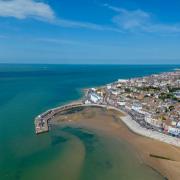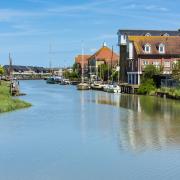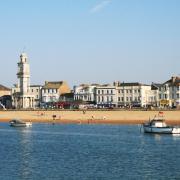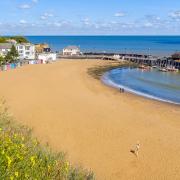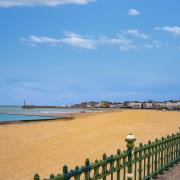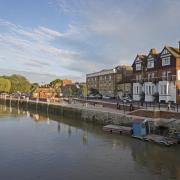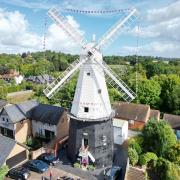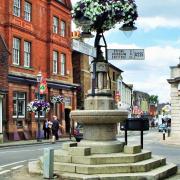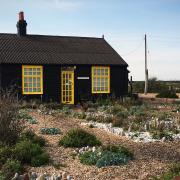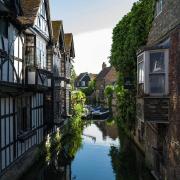Marlowe production puts county identity in the spotlight
Few counties have suffered more at the claws of urbanisation over recent decades than Kent. Such has been the onslaught of housing estates, roads, business parks and industrial development that its moniker The Garden of England can at times seem wholly inappropriate.
But it’s a term that sticks, even if we’re perhaps most likely to see it as part of some PR spiel promoting yet another assault of bricks and mortar taking away the very thing being used as one of the county’s main selling points.
So quite what the term means, if anything, to those who live and grow up here might be difficult to fathom.
Lest you don’t know, we can thank (or otherwise) King Henry VIII for Kent being bestowed with the title of the Garden of England, his ordered planting of the first cherry and apple orchards, at Teynham, near Sittingbourne, changing the way the county would be perceived for centuries to come.
And now that perception has been scrutinised in a project culminating in an impressively large community production spanning four days and involving more than 150 performers at Canterbury’s Marlowe Theatre.
The Garden of England was directed by Andrew Dawson, creative projects officer at the theatre. Lasting some three hours, it entailed a series of outdoor sketches performed primarily by members of Marlowe’s drama groups with seemingly no age group left out.
At which point it should be clarified that The Garden of England has – with the exception of a sketch in a garden created at The Marlowe Lab by students at Hadlow College – precious little to do with the county’s fruit-farming tradition.
Rather, it concerns people, particularly their movement in and out of the county. Immigration, exploitation, persecution and perception all feature large.
The 13th-century expulsion of the Jews, the arrival of the Huguenots from France some 400 years later and the modern-day issue of refugees are all covered; young children play out folk tales by a gypsy caravan at the front of the theatre; and the whole thing winds up in The Marlowe Studio with Dawson’s play Heaven’s Witness.
Performed by The Marlowe Ensemble, it relates the intertwined stories of a family who move to Kent from London in 2012 to escape a troubled history and, in 1574, that of the Marlowes, with son Christopher going in the opposite direction, to the capital, where his life is cut wickedly short.
Dawson explained what he was trying to do with The Garden of England: “It’s an idea that we decided upon as way of exploring Kentish identity. I was looking for something exclusive and large – 200 people come to Marlowe workshops and it’s difficult to draw in all those people.
“Looking at identity and community seemed a really good idea – it allowed us to explore different aspects of being Kentish. There’s the county’s agricultural abundance and the term Garden of England gives a sense of paradise, almost a Garden of Eden. We were asking if it is as idyllic as the name suggests.”
The production was clearly no small challenge – surely he didn’t write all of it?
“I wrote the studio play and some of the bits around the route. We used some additional material and Martin Gibbons from the focus group did some writing.
“Some of Marlowe’s words are in there and there are works from traditional poets as well as ideas picked up in and around Kent – there are different and disparate ideas, all of them linked.”
With such a big project, resources were stretched. “It was really a very small team to do something like this,” he said.
“We had just two permanent members of staff on it and the producer, Katherine Igoe-Ewer, was brilliant.”
There were many voluntary hands set to the task, though, with involvement from good folk at Canterbury Christ Church University and Hadlow College.
It was Hadlow students who created the garden at The Marlowe Lab, transforming a bleak and unlovely yard into a place of genuine attraction that will last way beyond the duration of the project.
“We’ve a lot of staff over there, so we wanted to create a nicer environment – the more we get involved in, the more we need usable outdoor space,” said Dawson.
Of the theatre’s six drama groups or companies, it was only the Diddies (two- to four-year-olds) and Minis (five- to seven-year-olds) who were not asked to participate – there had, after all, to be some limits to stop it all spiralling out of control.
Other than that, though, it was Junior Company upwards, bringing in an age range of seven to 77.
And, in the true sense of community theatre, groups as diverse as Kent Refugee Action Network (some of the actors were refugees), the police and museums all contributed.
So, as well as being an ambitious work involving a broad span of people and organisations, and of course the public, was this a production that was essentially selling a message?
“It’s not for me to communicate a singular message,” said Dawson. “Rather, it was to help people understand from an informed perspective. It wasn’t created from a staunch ideological point of view, but I hope it provoked discussion.
“Newcomers are often regarded with suspicion from all angles and it’s often just born out of ignorance or fear.”
As for the sheer logistics of the production, you suspected that potentially the most awkward logistics were getting the audience in from outside to the studio for the play, however smoothly it was achieved.
“All the transitions were challenging to achieve,” said Dawson. “But once you’ve got everyone into one place, it’s fine. Even so, it’s immersive theatre and people can act in quite unpredictable ways, so getting people inside and watching the show was a challenge.”
What many of those people might not have known was that John Marlowe was played by Chris Smith, the landlord of The Canterbury Tales just over the road from the theatre.
A novice at the game, his acting was one of the highlights of Heaven’s Witness, even allowing for “a bit of a wobble” with his lines in the final performance of the run.
“It was the first time I’d done any of this, even at school, so it was a nice escape for me to do something I’d never done before. I had some mental ups and downs doing it, especially for the last show, which you really want to do well in, but even that added to my experience.
“Most of them had their scripts by Christmas, but I knew nothing of it until early March. It was Saturday night and I’d probably had a glass of wine too many when Andy [Dawson] asked me if I’d like to step in and replace someone who had dropped out.
“The following day I’d had a sleep on it and thought ‘Yes, this is a challenge and I’m always up for a challenge’, so I thought I’d give it a go.
“I had no idea of the amount of work that goes into it, especially the rehearsals. We’d be in my pub hour after hour going through the lines. Of course, it’s not only learning the lines – you’ve got to know where you are on set and get your interaction right with the other guys. You’ve got to do a bit of acting as well.
“You could say I’m on stage every night in the pub, I suppose, but I enjoyed it so much I’d certainly never say never if the opportunity came up again.
“I’ve had so much fun with so many new friends all within the local community. It was a wonderful experience and I’d recommend it to anyone except those of a nervous disposition – it’s scary up there.
“I’ve seen how much how hard work goes into it and hats off to Andy and his production team – it’s a long time since I’ve seen so many people pulling together for the enjoyment of others.
“This has lifted my faith in teamwork, in youngsters, in the not-so-young and in the community and has opened my eyes to the value of what we are so lucky to have with The Marlowe Theatre right on our doorstep.”
At the other end of the spectrum is Sinclair Perry, the 11-year-old Barton Court pupil who played John Marlowe’s son, Kit.
For him, acting might just be in the blood. He is a member of The Marlowe Apprentice Company, which, he says, is “more about putting into practice than teaching”, while he has done “lots of acting at school”.
Even so, he accepts that this was his biggest challenge to date, “unless you count school productions as big”.
“It taught me a lot about how committed you’ve got to be and also how it’s just about having fun. It was also ‘Wow!’. It was such a big project and Andy had so much work to do – it was only when it all came together that you realised,” he said.
Aside from the acting experience, what did he take from what The Garden of England had to say?
“I didn’t see it as giving a message. It was teaching a story that you don’t want to land yourself in those places that my older self [Marlowe] found himself in and got in trouble.”
As for his future on stage, this young man is setting his sights high.
“I’ll just wait and see what there is – if there’s anything good. I’ve done lots of acting at school and there’s an acting club in the village. I took part in a variety show and was involved in the singing and acting, but I didn’t do the dancing.
“I want to be the Doctor [Who] – I’m a mega fan.”
The Garden of England, then, hit the spot. So what next for Dawson and his assembled talents?
“We’re always looking for new and different ways of showing what we do. I’m hoping for one production every year – we reach so many people and learn all sorts of things.
“We need to make sure we have the right infrastructure and support in the organisation. This was delivered with a lot of love from a lot of people – it was important to us as our community production that it was a success.
“It did a pretty good job of making its money back through ticket sales and footfall in the theatre.”
Job done and, if you were lucky enough to see the excitement of so many people – whether young or old – you just might be putting yourself forward next time round.




